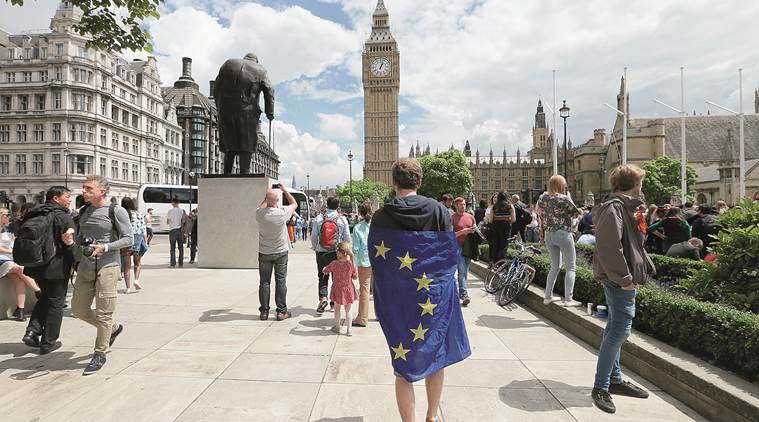Opinion The revolt in Brexit
Anxieties arising from the collapse of the welfare state lie behind the vote.

 A protester wrapped in the European Union flag in London. (AP File Photo)
A protester wrapped in the European Union flag in London. (AP File Photo)
FOR Anyone who attended the fourth conference of the Trade Unions International of Workers in Agriculture, Food, Commerce, Textiles and Allied Industries in Paris from June 13 to 16, with delegates from 86 countries of the world, or participated in the million strong demonstration through the Paris streets on June 14, the Brexit vote was no surprise. In fact, what was surprising was it took so long to materialise.
Delegate after delegate highlighted how in different countries, inequalities of income were growing, assets of the people were being plundered by a handful of rich and the multinationals, inflation was eroding incomes while unemployment kept increasing. In this background, policy decisions were imposed on governments by financial institutions that have amassed huge reserves well above the total debt burden of developing countries. Yet they continued to squeeze the majority of their citizens, in the name of austerity measures, increasing workload, and hire and fire policies under the cover of creating flexibility in employment.
Every country in Europe has seen the dismantling of the post-war welfare state that evolved as a response to the Soviet bloc straddling nearly half of the continent. But it has taken a generation for the truth to dawn on the mass of Europeans. We have seen upsurges in Spain, Greece, France, the Netherlands, Sweden, Poland, Portugal and Italy. Countries like Iceland could survive the austerity noose as they were not a part of the European Union.
To some, the British rejection is inspired by events in that country. So Brexit was coming, but the British collusion in the wars of West Asia, Afghanistan and the Balkans under the flag of NATO delayed the process.
There are still two major aspects of the people’s consciousness to tackle. The first is immigration. The immigrants are mostly refugees from countries attacked and destroyed by the US and NATO: Afghanistan, Libya, Syria, Somalia and Yemen, backed up by those from West and Central Africa. They were the targets of attack because of their wealth in terms of natural resources and for strategic reasons linked with the new Cold War with its imagined threat from Russia, China and North Korea that helped to bolster the arms trade. So the Brexit fear of immigrants from Eastern Europe is as much a myth as the war threat from the East is. But it creates confusion in minds suffering from the collapse of the welfare state services, stagnant wages and crushing unemployment.
It is from this angle then that we have to cope with confusion because it exacerbates the faultlines that exist in society as the Brexit has done in the case of Northern Ireland and Scotland, both of whom voted at sharp variance with England. The history of hundreds of years of oppression of the Irish people, who even succeeded in liberating a part of their country in the face of British obduracy, has now found a voice in the pro-EU vote they have cast. Scotland too, while it gave the Stuart Kings to Britain, never really integrated with the United Kingdom as it became the happy hunting ground of landlords, who drove out the peasants and found an outlet for them in the colonies.
Today what is far worse is the xenophobia that has afflicted individuals. The sense of losses going into trillions of dollars afflicting the predatory classes is also sought to be covered up by blaming immigrants and not the policies of the very people who followed the free market dispensation. Rather than becoming the targets of their own working class, they are looking for convenient scapegoats. They will not only create tensions between themselves over rising and falling currencies and their effect on the imports and exports, but they will divert the anger of the people from themselves to relatively helpless immigrant communities as Hitler did with the Jews. Worse, weaker economies will look for plunder in fresh pastures to make up for their losses, actual or imagined. What they need is empty threats and xenophobia rather than any real basis for conflict. In such conditions, destructive conflicts have been unleashed by the NATO and its allies, but they are getting too close to Russia for comfort.
The only way to counter this is by uniting the working people as the French unions are doing and to extend the struggles against unemployment, for food security, keeping prices of food and education down, as well as respect for the sovereignty of all national and international boundaries on the basis of mutual trust, freedom of movement and respect for democratic rights and principles of all concerned.


